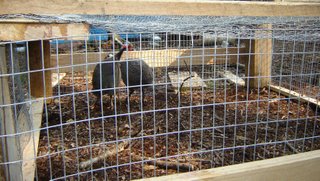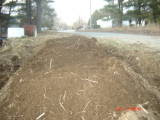Diabetes has become a fearsome epidemic in America. I bet someday they will trace it to partially hydrogenated corn syrup or some such thing. A doctor from India told me it is much more rare over there, but has been getting worse in recent years (probably thanks to globalized Industrial Farming).
I heard about Jerusalem artichokes helping people with diabetes, and have been growing them for a couple of years. Recently I gave Jerusalem artichokes to two sufferers of diabetes, and both reported being able to reduce their insulin shots. This is completely anecdotal and unscientific evidence, however, my two friends with diabetes are good enough evidence for me. There is a medical article in Russian referred to here:
http://www.ncbi.nlm.nih.gov/entrez/query.fcgi?cmd=Retrieve&db=PubMed&list_uids=7667959&dopt=Abstract
[Use of Jerusalem artichokes in diet therapy of patients with type II diabetes mellitus][Article in Russian]
Meshcheriakova VA, Plotnikova OA, Sharafetdinov KhKh, Iatsyshina TA.
When I get this article and translate it, I will post it here. Here's a couple of cooking/diet related links talking about Jerusalem artichokes and diabetes:
http://www.rwood.com/Articles/Foods_that_Help_Prevent_Diabetes.htm
http://www.inmamaskitchen.com/FOOD_IS_ART_II/food_history_and_facts/jerus_art.html
I have high hopes for Food-Medicine to help save diabetics money on insulin shots, as well as provide a regular market for Connecticut farmers. And even to get diabetes sufferers doing gardening themselves! I'll be glad to work with anyone who wants to turn their property into a Food-Medicine-Garden. I will provide you with Jerusalem artichokes bulbs, as well as show you where to get horse manure for free (you'll need a truck).
Jerusalem artichokes, or Helianthus tuberosus
http://en.wikipedia.org/wiki/Jerusalem_artichoke:
GROWING AND PROCESSING
Jerusalem artichokes, aka sunchokes, are very easy to grow. You don't need to water or weed, but you do need to dig vigorously when you harvest them.
Jerusalem artichokes need full sun and fertile soil. They are "heavy feeders," that is, they quickly deplete nutrients in the soil. They are also "leachates," that is, they can prevent excessive chicken manure from getting in the watershed:
http://www.energybulletin.net/18527.html
They are, furthermore (and here is where we cleverly integrate the chicken story) an effective filter of leachates because they are ravenous utilizers of nutrients. The more nutrients they get, the bigger the tubers get. They work well with high carbon substrates in preventing leachates from getting into the watershed. A good design is a layer of bark filters with Jerusalem artichokes planted in them.
They are a fantastic chicken habitat for several reasons: It is cooler in a dense Jerusalem artichoke thicket; worms collect in this environment, as Jerusalem artichokes manage their own ecology; they like chicken manure; and chickens eat the foliage.
--snip
I suggest to read the whole Energy Bulletin article just above. It goes into detail about Sunchokes as a survival food in a Peak Oil situation.
But you don't need chickens to have Jerusalem artichokes. Rotate them around your property, and dump a few truckloads of horse manure or compost every year around them. I can help you with that. Just contact me through the comments of this blog.

